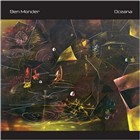Home » Jazz Articles » Album Review » Ben Monder: Oceana
Ben Monder: Oceana
Still, jazz has always had its share of artists who needed to be assessed over a larger body of work—and considerable time. Miles Davis, Wayne Shorter, Herbie Hancock...any of these artists might be inappropriately pigeonholed were one to select a single recording from their discographies as the sole determinant of their musical voices.
It's safe to say that guitarist Ben Monder, with a résumé including Maria Schneider's Orchestra, Guillermo Klein's Los Gauchos, and Paul Motian's Electric Bebop Band, fits this description. Oceana may not provide the complete picture, but it gives a broader view of Monder than most single releases, and it's unquestionably his most fully-realized record to date. It combines complex through-composition with influences ranging from contemporary classical music to Americana and progressive rock. Monder's tinted filter means these influences end up taking on more personal meaning.
It would be too easy to describe the opening solo acoustic guitar piece "Still Motion" as Metheny-informed. Certainly the folksy fingerpicking comes from that space, but Monder's melodies are more abstract than Metheny's accessible lyricism. "Double Sun," a solo electric guitar composition, is darker, evolving gradually and with periodically emerging melodies approaching pretty, only to ultimately be consumed by its hauntingly bleak ambience.
The title track features bassist Kermit Driscoll, drummer Ted Poor, and the wordless vocals of Theo Bleckmann. A knottily complex twelve-tone exercise in arpeggiation, it suggests how King Crimson's Robert Fripp might sound were he to take a softer approach and base it on a less constricted harmonic foundation. A series of episodes traverse a cross-spectrum of dynamics, creating an atmospheric form without ever really defining a consistent melody. Equally ethereal is "Echolalia," where Bleckmann builds a more discernable theme over the trio's soft cushion of arpeggios, brushwork, and long bass tones.
Skuli Sverrisson replaces Driscoll for "Rooms of Light" and "Spectre." On the former, Monder assumes a more aggressive stance with an overdriven tone that matches Sverrisson's powerful attack. This episodic, long-form piece runs the gamut from complex progressive rock to a soft but enigmatic respite, before the rock pulse returns and Monder delivers one of the only clearly delineated solos on the disc—referencing, to some degree, Allan Holdsworth in its rapid-fire legato style. The somber "Spectre" closes the album, with space and sound equal partners; the decay of notes is more meaningful than their gentle attack.
Keeping overt soloing at a minimum, Oceana defies any conventional jazz definition. But it's an album that could only be made by musicians versed in the jazz language and, consequently, deserves to be heard by those open-minded enough to see and feel its subtle connections.
Track Listing
Still Motion; Light; Oceana; Echolalia; Double Sun; Rooms of Light; Spectre.
Personnel
Ben Monder
guitarBen Monder: guitar; Theo Bleckmann: voice; Kermit Driscoll: bass (3, 4); Skuli Sverrisson: bass (5, 6); Ted Poor: drums.
Album information
Title: Oceana | Year Released: 2005 | Record Label: Sunnyside Records
Tags
PREVIOUS / NEXT
Ben Monder Concerts
Support All About Jazz
 All About Jazz has been a pillar of jazz since 1995, championing it as an art form and, more importantly, supporting the musicians who make it. Our enduring commitment has made "AAJ" one of the most culturally important websites of its kind, read by hundreds of thousands of fans, musicians and industry figures every month.
All About Jazz has been a pillar of jazz since 1995, championing it as an art form and, more importantly, supporting the musicians who make it. Our enduring commitment has made "AAJ" one of the most culturally important websites of its kind, read by hundreds of thousands of fans, musicians and industry figures every month.






















